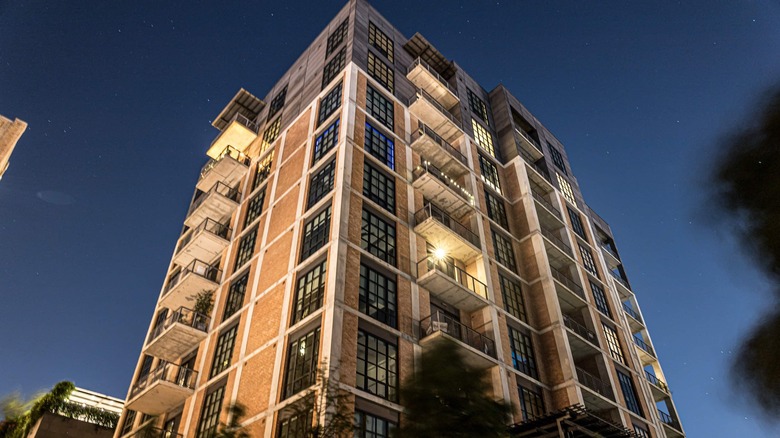5 Valuable Things To Know Before Buying A Condo
In the real estate world, condominiums are often considered a less expensive option compared to buying a single-family home. Condos, essentially, are residential properties where different individuals can purchase single or multiple units on the complex, explains Rocket Mortgage. But besides the relatively cheaper cost, they also come with several advantages, like completely hands-free living where the care and maintenance of the external environment are taken care of on your behalf. It is also common to find different shared amenities within the same building, like a gym and a swimming pool.
However, while buying a condo comes with plenty of perks, this residential property type has its own fair share of disadvantages as well. Different rules apply specifically to them and not single-family homes, and the kind of life you live in a condo is often quite different compared to other housing options. People also buy condominiums for different reasons, for example, as a second home or investment property. Nonetheless, knowing what you are getting yourself into is essential before putting your signature on the dotted lines. Here are five important things you need to be aware of before investing your hard-earned money in a condo.
1. Condos might not be that cheap to own
Condominiums are relatively cheaper on paper. In fact, according to MoneyGeek, the average cost of single-family homes is about $414,200, whereas a condominium goes for just around $289,000. However, before investing in one, you must read the fine print thoroughly. As mentioned earlier, you enjoy several other amenities when owning this type of residence; however, such luxuries usually come at a cost. In addition, owning a condo means that you are responsible for your individual unit maintenance; still, general maintenance of the whole property is shared among the unit owners, a union collectively referred to as Home Association Unit.
Owning a condo also comes with a supplementary HOA fee that entirely depends on the number of amenities available. If you factor in the HOA fees and the monthly mortgage contribution, it is possible that you would be paying more for the property per month than you would for a regular single-family house. But that is not all; you will also need to pay homeowner's insurance and a one-off payment to the HOA that goes to a reserve fund for future renovations.
2. Be wary of assessments
Another important thing to consider when thinking of buying a condominium is the special assessments. According to Realtor, a special assessment is a fund requested from the condo owners to help finance a major renovation if the association is short on money. Of course, such fees don't last forever, but they will surely hurt your pocket for the whole time you need to contribute.
On the other hand, it is worth mentioning that condominiums run under good management often don't need to resort to special assessment. In fact, most management departments charge more than they actually need just to have some money in the reserve for a rainy day. So whenever the roof needs replacement, or the external wall needs new painting, there are always enough funds in the reserve for these revamps.
So, before plunging ahead, go through the HOA financial books you should be given before the purchase. In fact, get a professional to look through these records and give you an expert opinion. Then, if they check out, you can go ahead with the purchase without worrying about random special assessment landing in your mailbox. On the flip side, if big additional taxes are scheduled for the near future, your best option is to walk away.
3. Carefully consider your lifestyle
Living in a condo is quite different than living in another property type. For example, while you don't necessarily have to worry about keeping your yard clean, you also don't get the privacy and comfort that comes with having a personal backyard. In addition, living in a condo means sharing walls, floors, and ceilings with other people, which means that every management union must have rules that every condo owner has to live by, often referred to as the covenants, conditions, restrictions, and easements (CC&Rs) (via Cornell Law School).
These rules have all the information about pet ownership, parking, and the internal improvements you are allowed to make as a unit owner under the management. While there may be restrictions when it comes to noise levels, you also need to remember that older buildings may not have insulations which means you might have to deal with a noisy neighbor once in a while. Generally, condos are ideal for people with no pets or small children. Remember, small children need enough space to run around and play while pets like dogs need to get regular exercise which might not be available in a condo building.
4. Mortgage requirements are different for condos
If you intend to finance your property through a mortgage, you should know that the requirements are a little different from a standard single-family home, for example. The difference comes in the amount of paperwork you need to fill out and the interest rates. According to TheTruthAboutMortgage, the interest rates are usually higher by a margin ranging between 0.125% and 0.25%. The reason for this is because of some restrictions and assessments from the HOA, which are usually out of the buyer's control and which lenders often consider as high risk.
The banker must clear the borrower and the condo project before financial lending is approved. In addition, they need to vet the condo project and make sure that it complies with all their requirements. In addition, to get financing for a condo, you need to know what type of loan you are going for and what the rules are for that particular funding option. A good example here is the Federal Housing Administration (an FHA loan) that only finances FHA-approved condos.
5. Do your due diligence on the management company
Buying a condo also means that you will need to work with the building's management company more often than you might imagine. This association is responsible for keeping things in tip-top shape, for instance, repairs, maintenance, and enforcing the rules, Ardent Residential notes. However, some companies that fail to administer the properties properly often ignore small issues that, over time, snowball into bigger problems. Sometimes such problems might cause some major repairs or, even worse, cause dangerous living conditions.
What's more, if the property is not well kept, there is a chance that you may have to pay higher HOA fees to take care of main restorations down the line. The best way to avoid all this is to do some background checks on the management company. The right way to start is by asking relevant questions: Get to know the people involved in the day-to-day maintenance operation of the property, do some research on its reputation and ask current owners about the enterprise. It is also worth speaking to your realtor about that particular firm. They are well experienced in this field and could have invaluable advice for you.





